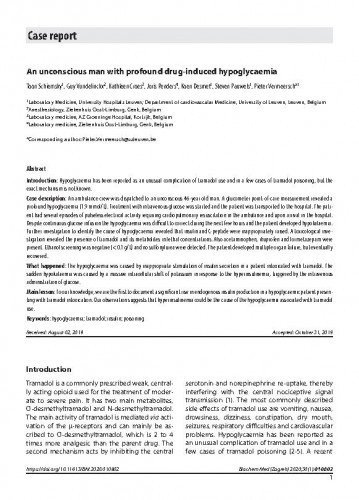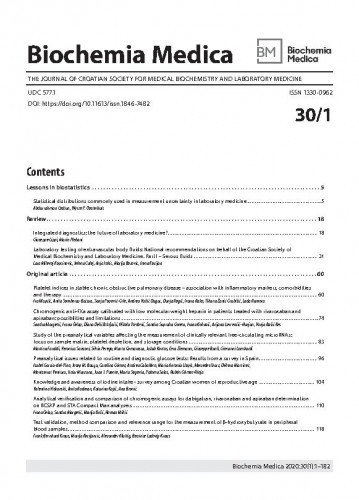Introduction: Hypoglycaemia has been reported as an unusual complication of tramadol use and in a few cases of tramadol poisoning, but theexact mechanism is not known.Case description: An ambulance crew was dispatched to an unconscious 46-year old man. A glucometer point-of-care measurement revealed aprofound hypoglycaemia (1.9 mmol/L). Treatment with intravenous glucose was started and the patient was transported to the hospital. The patienthad several episodes of pulseless electrical activity requiring cardiopulmonary resuscitation in the ambulance and upon arrival in the hospital.Despite continuous glucose infusion the hypoglycaemia was difficult to correct during the next few hours and the patient developed hypokalaemia.Further investigation to identify the cause of hypoglycaemia revealed that insulin and C-peptide were inappropriately raised. A toxicological investigationrevealed the presence of tramadol and its metabolites in lethal concentrations. Also acetaminophen, ibuprofen and lormetazepam werepresent. Ethanol screening was negative (<0.1 g/L) and no sulfonylurea were detected. The patient developed multiple organ failure, but eventuallyrecovered.What happened: The hypoglycaemia was caused by inappropriate stimulation of insulin secretion in a patient intoxicated with tramadol. Thesudden hypokalaemia was caused by a massive intracellular shift of potassium in response to the hyperinsulinemia, triggered by the intravenousadministration of glucose.Main lesson: To our knowledge, we are the first to document a significant rise in endogenous insulin production in a hypoglycaemic patient presentingwith tramadol intoxication. Our observation suggests that hyperinsulinemia could be the cause of the hypoglycaemia associated with tramadoluse.
Sažetak

 Biochemia medica : the journal of Croatian Society for Medical Biochemistry and Laboratory Medicine : 30,1(2020) / glavna i odgovorna urednica Daria Pašalić.
Biochemia medica : the journal of Croatian Society for Medical Biochemistry and Laboratory Medicine : 30,1(2020) / glavna i odgovorna urednica Daria Pašalić.